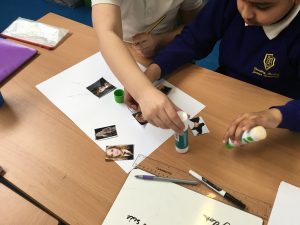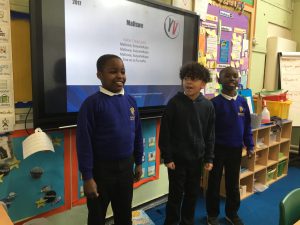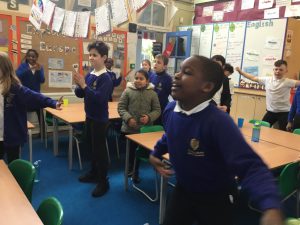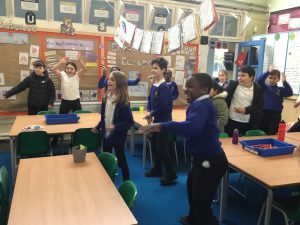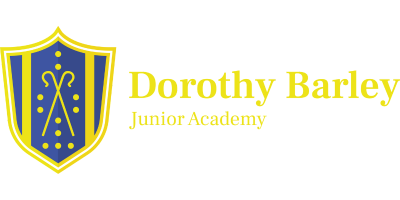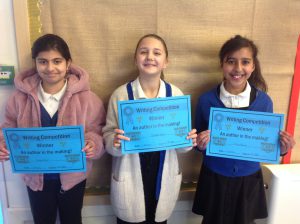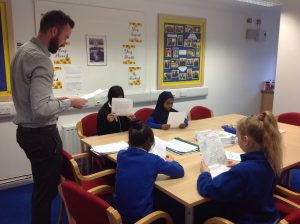Literacy at Dorothy Barley Junior Academy
‘You can find magic wherever you look. Sit back and relax all you need is a book!’ – Dr. Seuss
Literacy Intent
Writing Intent:
At Dorothy Barley Junior Academy, we believe that every child should leave our school with the necessary skills to write for a range of purposes.
We have created exciting overviews to ensure that, throughout their school journey, our pupils work with a range of high quality texts and topics. Our long term planning guarantees we ensure that the genre coverage is broad and balanced and each half term children will have the opportunity to write to entertain, write to persuade and write to inform while ensuring that they have opportunities to build on previously taught skills and acquire new skills year on year. Literacy at Dorothy Barley Junior Academy involves retelling stories, creating stories and using Talk4Writing by Pie Corbett in non-fiction units. We know that there is a national writing gap between boys and girls, and with this in mind we select ‘boy friendly’ texts and topics, which all pupils respond positively to.
Reading Intent:
Reading is a key life skill that enables our pupils to acquire knowledge as well as develop culturally, emotionally, intellectually, socially and spiritually. It is our aim that our pupils leave DBJA reading fluently, easily and with good understanding. To engage and inspire children, in reading, we use a whole class approach which follows the Destination Reader structure. Children are given the opportunity to read fiction and non-fiction books which are both age appropriate books (enjoyed as a whole class) and ability appropriate books. The approach allows for key skills to be modelled and embedded while increasing the children’s reading mileage and love of reading. When phonics teaching is required, we use the Little Wandle phonics scheme.
Oracy Intent:
Oracy is a multi-disciplined skill that stretches over a variety subjects. At Dorothy Barley Junior Academy, we place a strong emphasis on developing children’s speaking abilities and feel it has always been a skill that is overlooked. To combat this, we have introduced several strategies that spans the majority of the curriculum.
Reading and Writing at Dorothy Barley Junior Academy
Writing:
Writing at Dorothy Barley Junior Academy involves retelling stories, creating stories and using Talk4Writing in non-fiction units. We ensure that genre coverage is broad and balanced and each half term children will have the opportunity to write to entertain, write to persuade and write to inform. Where possible, we make links with the wider curriculum topics and themed weeks, e.g. Black History and The Stone-Age. Medium term plans ensure that within each writing unit the writing process is carefully mapped out to encourage the learning of new skills and embed their understanding while ensuring they are given the opportunity to draft and edit their work. Our pupils are able to publish whole pieces of writing they are proud of.
We deliver the teaching of the National Curriculum using exciting and creative approaches such as drama, debate and arguments, shared writing and role on the wall, so that our pupils are able to orally rehearse their ideas for writing. This supports our pupils to take on the role of a writer, with an authentic voice.
Writing Progression:
DBJA Progression in Writing
Reading:
The children of Dorothy Barley are proud of their writing and there are many examples of high quality writing displayed around the school for visitors to enjoy.
To engage and inspire children, in reading, we use a whole class approach which follows Destination Reader. Children are given the opportunity to read both age appropriate books, which are enjoyed as a whole class, and ability appropriate books.
The approach allows for key skills to be modelled and embedded while increasing the children’s reading mileage and love of reading. When phonics teaching is required, we use the scheme Little Wandle.
Destination Reader Structure:
At the beginning of each reading lesson, the teacher leads a whole-class reading strategies session. During this time, we explicitly teach pupils the strategies (inferring, clarifying, questioning, summarising, predicting, evaluating or making connections) needed to become a proficient reader. During the second part of the session, all the children will take part in paired reading with either an age appropriate book or ability appropriate book. During this time, the class teacher works with a different focus group of up to 6 children daily and records in the children’s ‘Running Reading Records’.
On Fridays, the children will complete a ‘Big Picture’ lesson, which focuses on comprehension skills with seen or unseen books and texts. The teacher will model answering the four question types using the CLEAR code. Throughout the school, we use banded books that are matched closely to the pupils reading ability, as well as carefully selected real books/extracts for this session.
Shared Reading Aloud:
Our class teachers know that they are reading role-models and regularly read aloud to their class. Sharing a good book will help our children to develop a love of reading as well as help the children to absorb regular language patterns, and broaden their vocabularies. All classes share a book at the end of each school day.
Assessments:
Children are assessed in a variety of ways:
- Weekly through Big Picture lessons
- Termly tests
- Termly speed reading to assess their reading pace and fluency
- Termly phonics testing
Book Overview – Year 3
Book Overview – Year 4
Book Overview – Year 5
Book Overview – Year 6
The ARP Reading, Writing and Book Overview
Writing Assessment
At Dorothy Barley Junior Academy we encourage our children to take ownership of their own learning and progress across all subjects. In writing, the children have target cards that they are able to refer to when working in order for them to include all relevant skills in their writing and to make relevant improvements to their work independently.
Year 3 Pupil Writing Target Cards
Year 4 Pupil Writing Target Cards
Year 5 Pupil Writing Target Cards
Year 6 Pupil Writing Target Cards
Spellings and Handwriting
To support the children’s writing we dedicate daily time in our timetable to the teaching of spelling and handwriting. At Dorothy Barley Junior Academy, we use the Nelson Handwriting Scheme to support the teaching of handwriting. Nelson Handwriting is a whole- school programme designed to help all children develop a confident, legible and personal handwriting style and meet higher curriculum expectations.
Nelson Handwriting Curriculum Information
For spelling each week, every year group work on a different spelling pattern and are tested weekly on their progress. The children are encouraged to use the words in their writing to broaden and extend their vocabulary.
Please find the spelling patterns for each week below and the statutory spelling lists for you to support your child with at home:
Year 3 Spelling Overview (All Terms)
Year 4 Spelling Overview (All Terms)
Year 5 Spelling Overview (All Terms)
Year 6 Spelling Overview (All Terms)
Year 3 + 4 Statutory Spellings
Year 5 +6 Statutory Spellings
Competitions
We like to encourage the children to complete our exciting ‘Extreme Reading Challenge’ over the summer holidays. Take a look at some of the entries that we have had in the past:
Extreme Reading Challenge Letter – December 2021
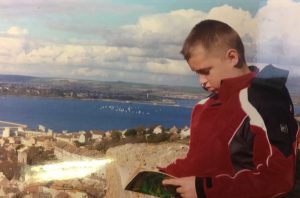
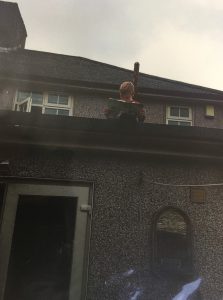
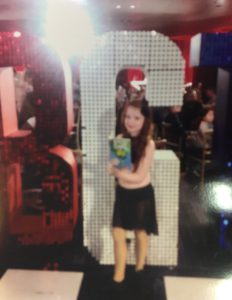
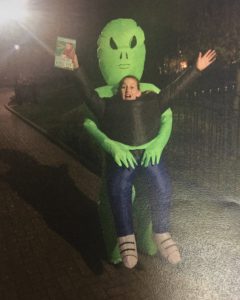
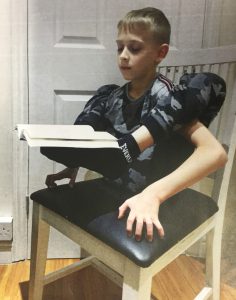
For our writing competition, we involve the Learning Council in judging the entries. The entries for our 2022 competition are currently being reviewed and we will update with the winners as soon as they are announced.
Writing Competition Letter (Spring) – Friday 21st January 2022
Writing Competition Winners (with a little help from our Literacy Learning Council on deciding on who to pick!)
Classroom Displays
All classroom use their learning environment to support children independently work in lessons. This is either through fixed displays, with subject knowledge that is needed through every genre or topic or working walls that is developed daily, matching the specific learning happening in the current lesson. We also have displays that support with Oracy and discussion. Please see examples below. It would be useful for you to try some of these examples at home to generate and structure your discussions:
Discuss Poster.docx
Engage Poster
Listen Poster
Home Learning
BugClub is used at home to support home-learning.
Bug Club is a core reading program to help develop confident and motivated readers. It combines over 500 finely levelled books with interactive eBooks and an online reading world – so books can be allocated to individual pupils for home reading and assess their progress instantly.
- An enormous range of fiction, non‑fiction and poetry, offering variety to keep children engaged and develop a love of reading.
- Features well‑known characters from film and television.
- Finely levelled to give children manageable steps in reading progression and a real sense of ongoing achievement as they move through the levels.
- Assessment at your fingertips. Bug Club comes with Progress & Assess, with tests for every book band and tracking tools to help you really understand your pupils’ progress in all of the key reading fluency and comprehension skills.
- An online toolkit, designed to save you time, allowing you to allocate eBooks and curriculum-matched resources to a class, group or individual and then track every child’s progress.
ActiveLearn: Login (activelearnprimary.co.uk)
Bug Club Login Support
Themed Weeks
At Dorothy Barley Junior Academy, the students and staff celebrated World Book Week during the week 28th February 2022. At the start of the week, we dressed up as characters from our favourite books and we learnt about African culture and the importance of diversity by reading books from Kunda Kids. Each book that the children read had an important message about diversity and treating others with respect and kindness. These are some of our key learning values that we promote for children within our school to adhere to. The children participated in a number of activities: dancing, role-play, art and singing. Students were encouraged to bring in their favourite books from home to share with the class and further promote a love of reading. At the end of the week, children received vouchers to spend on books in local book stores. Take a look at some of the creative costumes that our staff and pupils dressed up in to promote the love of reading throughout the school:
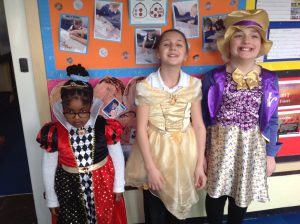
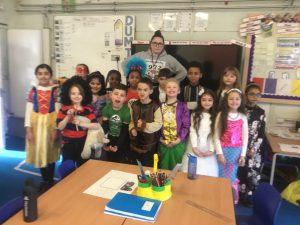
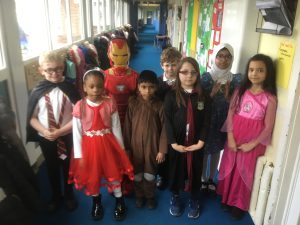
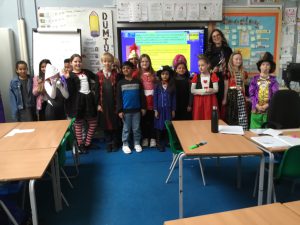
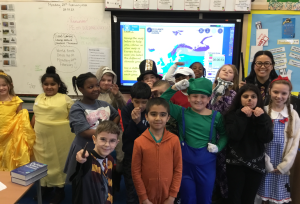
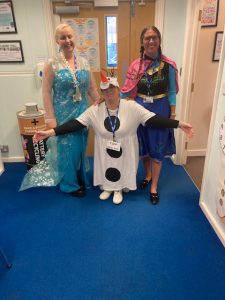
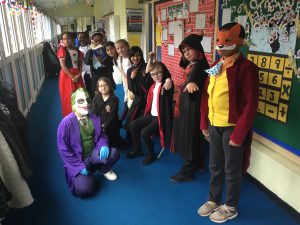
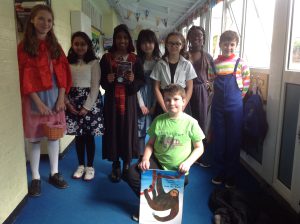
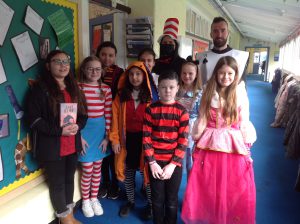
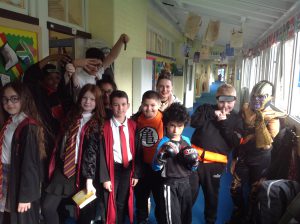
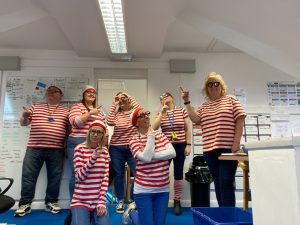
Here is some of the exciting work that took place during Book Week too:
